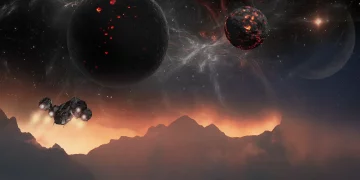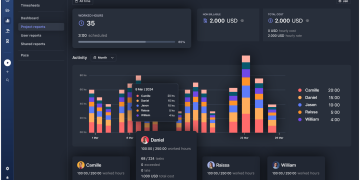Introduction: The Elusive Nature of Horizons
The horizon has long been a symbol of the unknown—an ever-distant line that represents the boundary between the familiar world and the vast, mysterious expanse that lies beyond. It has been depicted in art, science, and philosophy as a place of endless possibility. However, what happens when this horizon, both literal and metaphorical, becomes too close to see? What occurs when the line between the known and unknown disappears or shifts so drastically that we can no longer perceive it?
In this article, we will explore what happens when horizons become too close to see, diving into the philosophical, psychological, and scientific implications. We will look at how the concept of “horizon” influences our lives, our understanding of the universe, and even the very fabric of reality itself.
1. The Horizon as a Concept
Before we can explore the idea of the horizon becoming too close to see, we must first understand what the horizon represents. Traditionally, the horizon is the boundary at which the earth’s surface and the sky appear to meet. To the human eye, this line is both an optical illusion and a symbol of limitation. It represents the furthest distance we can perceive with our senses.
However, the horizon is not just a physical concept. In a more abstract sense, it can be seen as the boundary of human knowledge, the point at which we no longer have access to new information. For centuries, humanity has looked to the horizon—whether it be the horizon of the seas, the sky, or even intellectual frontiers—as a source of inspiration and mystery.
Philosophers like Immanuel Kant have suggested that the horizon represents the limits of human perception. We cannot see beyond it because our cognitive faculties are bounded by space and time. The horizon, therefore, represents the boundary of human experience, a reminder that we cannot comprehend everything about the world or the universe.

2. The Physical Horizon: A Question of Perspective
On a purely physical level, the horizon is defined by the curvature of the Earth. As we travel, the horizon shifts depending on our vantage point. The closer we get to a body of water or a vast open space, the further away the horizon appears. But what happens if we move closer to it?
At a certain point, the horizon becomes less distinct. As we approach the edge of a vast expanse, the line where the earth and sky meet becomes harder to discern. The curvature of the Earth causes the horizon to flatten out. For example, at sea level, the horizon appears to be far in the distance, but if one ascends to a higher altitude, such as on a mountain or in an airplane, the horizon spreads out, and the distant line becomes more spread out and less defined.
As we move closer to the horizon, it starts to lose its sharpness and distinction, particularly in flat, featureless landscapes. This can be unsettling for the human mind, which is accustomed to relying on this visible boundary to help orient ourselves in space. Without it, we may feel lost, disoriented, and disconnected from the environment.
From a scientific perspective, when horizons become too close, they start to lose their relevance. We move from perceiving a distant boundary to facing an environment where space becomes more ambiguous. This shift in perception is akin to reaching the event horizon of a black hole, where the very concept of distance and time breaks down.
3. The Metaphorical Horizon: The Limits of Human Understanding
While the physical horizon offers a tangible point of reference, the metaphorical horizon is even more fascinating. It is the line that separates what we know from what we do not yet understand. But when these metaphorical horizons become too close, we face a profound challenge.
In a society where knowledge is rapidly expanding—whether through technological advancements, scientific discoveries, or cultural shifts—our metaphorical horizons are continuously pushed. However, the more we learn, the more we realize that there is an infinite expanse of knowledge yet to be uncovered. The closer we get to this horizon, the more overwhelming and unfathomable the unknown becomes.
In some ways, the rapid progress of technology and science has brought us closer to the edge of this horizon. Artificial intelligence, quantum computing, and space exploration are all fields that have brought us face-to-face with previously unimaginable possibilities. Yet, these advances also expose how little we truly know. As we approach the frontier of human understanding, the horizon becomes increasingly elusive, receding just beyond our reach.
This phenomenon is often described as the “knowledge horizon”—the idea that the closer we get to understanding the universe, the more we realize there is still to learn. The paradox lies in the fact that this boundary of knowledge seems to recede as we advance, creating an ever-expanding gulf between what is known and what is unknown.
4. The Psychological Implications: The Fear of the Horizon
Human beings have long been drawn to the horizon—whether it is the horizon of the ocean, the mountains, or the stars. It symbolizes the promise of discovery, new experiences, and opportunities. However, when the horizon becomes too close to see, we are faced with psychological implications that challenge our sense of purpose and identity.
Psychologists have studied the concept of “horizon anxiety,” a term used to describe the fear and discomfort that arises when the horizon—both literal and metaphorical—becomes too ambiguous or unreachable. This feeling can arise in moments of uncertainty, such as during periods of rapid change, or when we encounter a crisis that threatens to erase our familiar boundaries.
As horizons draw closer and the lines between the known and the unknown blur, individuals may feel a loss of orientation. In the same way that standing on a flat, featureless plain can disorient the senses, the shrinking of the metaphorical horizon can create a sense of disconnection from both self and society. People may struggle to find meaning or direction when the “endless horizon” that once symbolized possibility is no longer visible or accessible.
This psychological dissonance can manifest in various ways. People may experience a sense of overwhelm, anxiety, or even existential crisis, as they struggle to find solid ground in a world where the boundaries of knowledge and identity become increasingly unclear.
5. The Philosophical Horizon: A Call for Reflection
Philosophers have long wrestled with the concept of the horizon, particularly in relation to human perception and existence. As the horizon becomes closer and less distinguishable, we are invited to reflect on the very nature of knowledge and existence.
For existentialists, the horizon is not just a physical boundary but a metaphor for the limits of human experience. The philosopher Martin Heidegger, for example, argued that the human experience of being is always limited by our horizon—our ability to see, know, and understand the world. To approach this horizon too closely, for Heidegger, is to confront the limits of human existence itself.
The philosopher Søren Kierkegaard, on the other hand, would suggest that the closer we get to the horizon, the more we are confronted with the absurdity and uncertainty of life. As we reach the boundary of what we know, we are faced with the “leap of faith”—the moment when reason and understanding break down, and we must embrace the unknown with courage and conviction.

Both Heidegger and Kierkegaard emphasize the need to embrace the horizon as a reminder of the impermanence and finitude of human existence. The more we approach this horizon, the more we are called to confront the deeper truths of life and death, knowledge and ignorance, certainty and doubt.
6. The Event Horizon: A Cosmic Analogy
In a literal sense, the “event horizon” is a term used in astrophysics to describe the boundary around a black hole, beyond which nothing, not even light, can escape. The event horizon represents a point of no return, where the known laws of physics break down, and all that remains is an all-encompassing singularity.
The analogy between the event horizon and the metaphorical horizon is powerful. Just as the closer we get to a black hole, the more distorted our perception of time and space becomes, the closer we get to the edge of human knowledge, the more our understanding of reality becomes warped. At this “edge,” the usual rules of logic and perception may no longer apply, and we are left facing the infinite and the unknown.
In this sense, the event horizon is not just a physical boundary but a metaphor for the ultimate limit of human understanding—a reminder that the horizon, no matter how close it becomes, will always recede just as we approach it.
Conclusion: The Horizon as a Metaphor for Life
The horizon, whether literal or metaphorical, serves as a powerful reminder of our limits and our potential. When horizons become too close to see, we are left with a profound sense of both disorientation and possibility. We may feel uncertain, lost, or overwhelmed, but this experience also invites us to reflect on the nature of our existence and our place in the universe.
As we continue to push the boundaries of knowledge and exploration, we must remember that the horizon is not just a barrier but a horizon of opportunity. It is the line that challenges us to reach beyond ourselves, to embrace the unknown, and to confront the very nature of our reality.
When horizons become too close to see, we are left with a choice: to retreat into the safety of the familiar, or to venture forward into the uncharted territory of discovery and growth.























